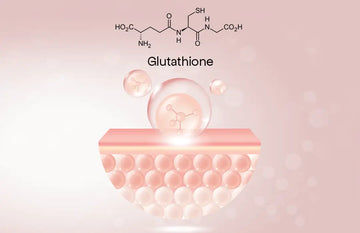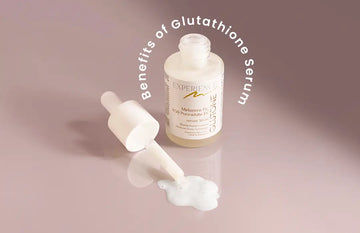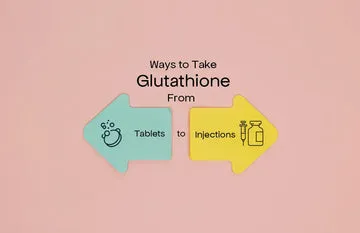What Is Glutathione Reduced?
Every cell in your body possesses a powerhouse antioxidant called glutathione. But not all forms are equal. In particular, reduced glutathione, often referred to in its fully active form, is the one doing all the heavy lifting. So let's break it down:
What Does Glutathione Reduced Mean?

GSH (Reduced glutathione) is the active form of glutathione that helps your cells stay healthy by fighting off harmful substances called free radicals. Think of it as your body's cleanup crew. When GSH does its job, it can get used up and turn into a form called GSSG (oxidised glutathione), which doesn’t work the same way. Thankfully, your body can recycle GSSG back into GSH with the help of an enzyme called glutathione reductase, using energy from another helper molecule called NADPH.
How the Body Produces Reduced Glutathione
The body produces reduced glutathione naturally through a two-step process involving key amino acids—cysteine, glycine, and glutamate. These building blocks are assembled with the help of specialized enzymes such as glutamate-cysteine ligase and glutathione synthetase. Once formed, glutathione cycles between its reduced (GSH) and oxidized (GSSG) states to maintain cellular balance. This redox cycle ensures constant antioxidant protection, helping neutralize free radicals and regenerate other antioxidants like vitamin C and E. Essentially, the body’s ability to produce and recycle reduced glutathione determines how effectively it can defend against oxidative stress and maintain cellular health over time.
Why the GSH Form Matters
-
Antioxidant Action
GSH neutralises reactive oxygen species (ROS) like peroxides and free radicals. This protects cells from oxidative damage and supports ageing and skin health.
-
Detoxification & Liver Support
GSH plays a central role in Phase II detoxification, binding toxins to make them easier to eliminate.
-
Immune & Cellular Protection
Healthy GSH levels support immune function, regenerate vitamins C and E, and assist enzyme systems like glutathione peroxidase. A high GSH:GSSG ratio signals strong cellular health and acts as a biomarker for oxidative stress. The higher the intracellular concentration of GSH, the better the protection against oxidative stress, disease progression, and ageing.
-
Amino Acid Transport
GSH is also involved in the transport of amino acids across cell membranes, supporting protein synthesis and repair processes.
Why the GSH: GSSG Ratio Matters
The GSH:GSSG ratio is a critical marker of cellular redox status. A higher ratio indicates that your cells are well-equipped to handle oxidative stress and maintain metabolic function. When GSH is depleted or when oxidised GSSG accumulates, cells experience damage that accelerates ageing, inflammation, and chronic disease.
This is why boosting GSH levels and keeping the GSH:GSSG ratio high is essential for maintaining long-term cellular health.
Sources of Reduced Glutathione
-
Sulfur-rich foods such as garlic, onions, broccoli, Brussels sprouts, and kale help boost natural glutathione production.
-
Fresh fruits and vegetables like spinach, avocados, and asparagus contain compounds that support healthy glutathione levels.
-
Nutrients such as selenium, vitamin C, and vitamin E act as essential cofactors, enhancing glutathione’s antioxidant function.
-
Whey protein provides cysteine, a critical precursor that promotes glutathione synthesis.
-
Regular dietary intake of these foods strengthens the body’s natural defense system and sustains optimal reduced glutathione levels.
Factors That Deplete Glutathione Levels
Glutathione reserves can decline due to multiple factors. Chronic stress, poor diet, and exposure to toxins like pollution, alcohol, smoking, and processed foods strain the body’s defenses. Aging naturally lowers production, while illnesses, infections, and certain medications speed up depletion—making it vital to adopt habits that help preserve healthy levels.
Why Supplement with the Best Glutathione Supplement: Glutone 1000?

While your body produces GSH naturally, chronic stress, medication, pollution, toxin accumulation, and ageing rapidly deplete your reserves. Supplementing with a high-quality glutathione supplement helps you maintain optimal levels, especially when lifestyle and diet fall short.
Glutone 1000: Sustaining Glutathione with Bioavailable Support
Glutone 1000 is a clinically backed effervescent supplement that offers:
-
600 mg Setria® L‑Glutathione – a pure, bioavailable form of reduced glutathione
-
400 mg NAC (N-acetylcysteine) – a precursor to help your body maintain GSH levels internally
-
Effervescent Technology – promotes faster absorption and improved bioavailability
-
Orange flavour – easy to consume and gentle on the stomach
Because reduced glutathione (GSH) is readily oxidised in the body, pairing it with NAC helps prolong its effects and restore levels continually. The effervescent form bypasses traditional digestion routes, making it more efficient than typical capsules or tablets.
Together, these features make Glutone 1000 one of the best glutathione supplements to support:
-
Skin Brightening and Radiance
GSH helps in reducing oxidative stress that causes dullness, supporting clearer and more even-toned skin over time.
-
Detoxification and Liver Function
Glutathione binds to toxins and heavy metals, converting them into water-soluble forms that your body can eliminate through urine or bile.
-
Immune Health
It plays a key role in regulating immune cells, helping them fight infections more effectively while also calming overactive immune responses.
-
Cellular Repair and Anti-Ageing
GSH supports DNA repair and cell regeneration, which helps slow visible signs of ageing like wrinkles and fatigue, and maintains the overall integrity of cellular structures.
How to Boost Reduced Glutathione Levels Naturally
Fortunately, several natural approaches can help restore and maintain healthy glutathione levels.
-
Diet: Sulfur-containing vegetables, vitamin C–packed fruits, and quality protein supports the body’s production of GSH.
-
Exercise: Regular exercise has been shown to enhance antioxidant capacity, while adequate sleep allows for proper cellular repair.
-
Healthy Lifestyle: Avoiding excessive alcohol, smoking, and processed foods also prevents unnecessary depletion.
By combining these lifestyle habits with mindful nutrition, individuals can strengthen their natural defense system and maintain long-term cellular protection.
How does this help you?
So, what is glutathione reduced? It's your body’s frontline antioxidant. An essential molecule protecting your cells from oxidative wear and tear. Knowing "what does reduced glutathione do?" and understanding the significance of the GSH:GSSG ratio gives you insight into how your body responds to stress and disease.
To keep your antioxidant defence system strong, choosing the best glutathione supplement like Glutone 1000 is a proactive, effective way to support long-term cellular health and wellness.
Give your body the antioxidant armour it deserves with Glutone 1000 today!








 Mon to Sat - 10 am to 7 pm
Mon to Sat - 10 am to 7 pm